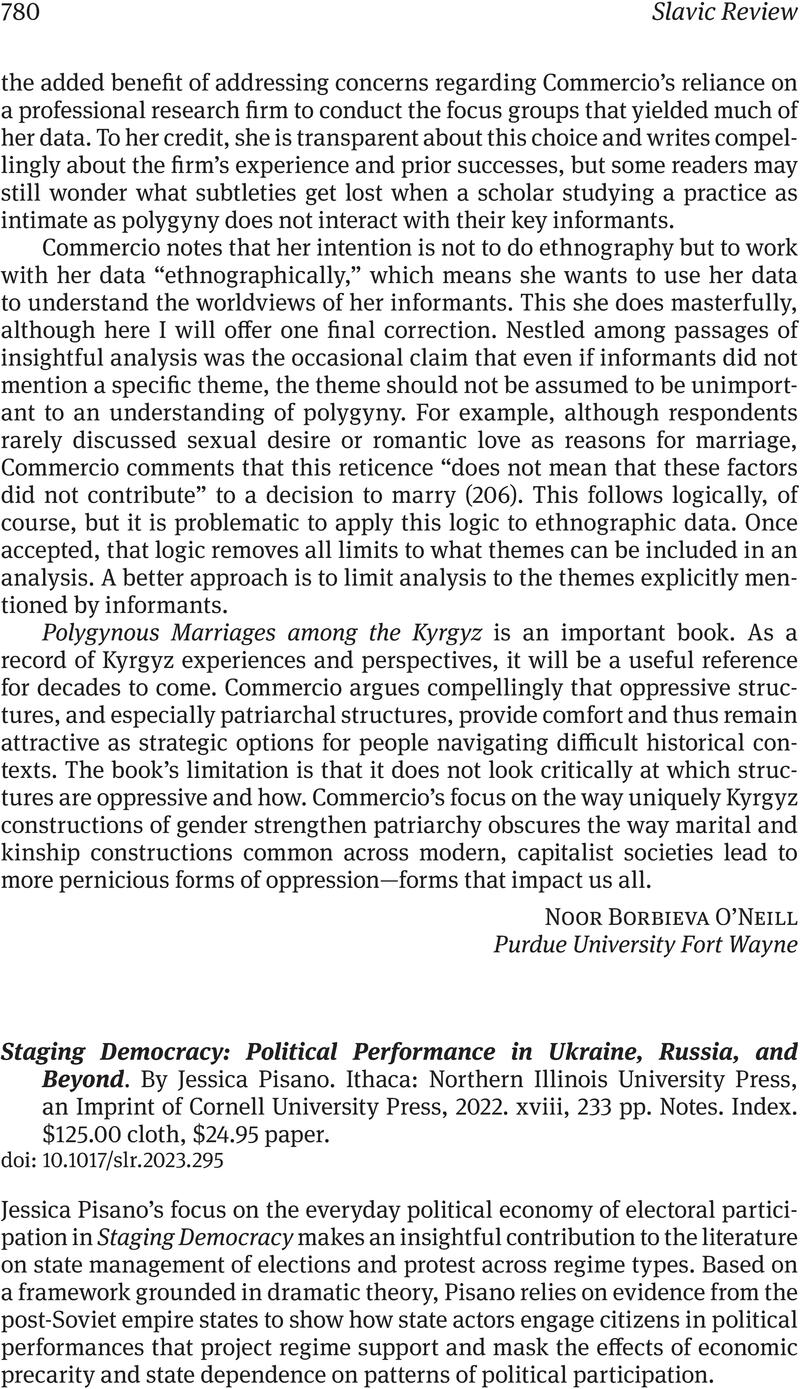No CrossRef data available.
Article contents
Staging Democracy: Political Performance in Ukraine, Russia, and Beyond. By Jessica Pisano. Ithaca: Northern Illinois University Press, an Imprint of Cornell University Press, 2022. xviii, 233 pp. Notes. Index. $125.00 cloth, $24.95 paper.
Review products
Published online by Cambridge University Press: 26 January 2024
Abstract

- Type
- Featured Reviews
- Information
- Copyright
- Copyright © The Author(s), 2024. Published by Cambridge University Press on behalf of Association for Slavic, East European, and Eurasian Studies
References
1. For examples of labor response to market pressures see Crowley, Stephen, Putin's Labor Dilemma: Russian Politics between Stability and Stagnation (Ithaca, 2001)Google Scholar; Morris, Jeremy, Everyday Post-Socialism: Working-Class Communities in the Russian Margins (Basingstoke, Eng., 2016)CrossRefGoogle Scholar; Morris, Jeremy, “The Informal Economy and Post-Socialism: Imbricated Perspectives on Labor, the State, and Social Embeddedness,” in “Supp. Russia's Informal Economy: A Special Issue” of Demokratizatsiya: The Journal of Post-Soviet Democratization 27, no. 1 (Winter 2019): 9–30Google Scholar.
2. Dollbaum, Jan Matti, “When Does Diffusing Protest Lead to Local Organization Building? Evidence from a Comparative Subnational Study of Russia's ‘For Fair Elections’ Movement,” Perspectives on Politics 20, no. 1 (March 2022): 53–68CrossRefGoogle Scholar; Smyth, Regina, Elections, Protest, and Authoritarian Regime Stability: Russia 2008–2020 (Cambridge, Eng., 2020)CrossRefGoogle Scholar; Zelinska, Olga, “How Social Movement Actors Assess Social Change: An Exploration of the Consequences of Ukraine's Local Maidan Protests,” International Journal of Sociology 51, no. 4 (2021): 284–303CrossRefGoogle Scholar.
3. For detailed discussions of the mechanisms of social change related to the Orange Revolution and Revolution of Dignity see Brudny, Yitzhak M. and Finkel, Evgeny, “Why Ukraine is not Russia: Hegemonic National Identity and Democracy in Russia and Ukraine,” East European Politics and Societies 25, no. 4 (November 2011): 813–33CrossRefGoogle Scholar; Kulyk, Volodymyr, “National Identity in Ukraine: Impact of Euromaidan and the War,” Europe-Asia Studies 68, no. 4 (June 2016): 588–608CrossRefGoogle Scholar; Onuch, Olga, Mapping Mass Mobilization: Understanding Revolutionary Moments in Argentina and Ukraine. (Basingstoke, Eng., 2014)CrossRefGoogle Scholar; Smyth, Regina, “Considering the Orange Legacy: Patterns of Political Participation in the Euromaidan Revolution,” Post-Soviet Affairs 34, no. 5 (September, 2018): 297–316CrossRefGoogle Scholar.
4. Clement pioneered work on local activism: Karine Clément, “From ‘Local’ to ‘Political’: The Kaliningrad Mass Protest Movement of 2009–2010 in Russia,” in Urban Grassroots Movements in Central and Eastern Europe (London, 2016), 163–93.
5. Jeremy Morris, Andrei Semenov, and Regina Smyth, Varieties of Russian Activism: State-society Contestation in Everyday Life (Bloomington, IN., 2023).
6. Gulnaz Sharafutdinova, The Red Mirror: Putin's Leadership and Russia's Insecure Identity (Oxford, 2020); see also Sharafutdinova, The Afterlife of the ‘Soviet Man’: Rethinking Homo Sovieticus (London, 2023).
7. Olga Malinova, “Legitimizing Putin's Regime: The Transformations of the Narrative of Russia's Post-Soviet Transition,” Communist and Post-Communist Studies 55, no. 1 (March 2022): 52–75.
8. For compelling examples see: Katie L. Stewart, “Cultural Production as Activism: National Theaters, Philharmonics, and Cultural Organizations in Russia's Regional Capitals,” in Morris, Smyth, and Semenov, eds., Varieties of Russian Activism, 31–52; and Elizabeth A. Wood, “Performing Memory: Vladimir Putin and the Celebration of World War II in Russia,” Soviet and Post-Soviet Review 38, no. 2 (2011): 172–200.
9. Both Pisano and I speak to this issue on our earlier work: Jessica Pisano, The Post-Soviet Potemkin Village: Politics and Property Rights in the Black Earth (Cambridge, Eng., 2008); Regina Smyth, Candidate Strategies and Electoral Competition in the Russian Federation: Democracy without Foundation (Cambridge, Eng., 2006).
10. Pauline Jones, Institutional Change and Political Continuity in Post-Soviet Central Asia: Power, Perceptions, and Pacts. (Cambridge, Eng., 2002).
11. Cole J. Harvey, “Principal–Agent Dynamics and Electoral Manipulation: Local Risks, Patronage and Tactical Variation in Russian Elections, 2003–2012,” Europe-Asia Studies 72, no. 5 (May 2020): 837–62.
12. Vladimir Gel΄man, The Politics of Bad Governance in Contemporary Russia (Ann Arbor, MI, 2022), 312; Jeremy Morris, “Russia's Incoherent State,” Current History 118, no. 810 (October 2019): 251–57; and Vladimir Gel΄man and Margarita Zavadskaya, “Exploring Varieties of Governance in Russia: In Search of Theoretical Frameworks,” Europe-Asia Studies 73, 6 (July 2021): 971–88; on Ukraine, see: Henry E. Hale and Robert W. Orttung, eds., Beyond the Euromaidan: Comparative Perspectives on Advancing Reform in Ukraine (Stanford, 2016); Serhiy Kudelia, “The Sources of Continuity and Change of Ukraine's Incomplete State,” Communist and Post-Communist Studies 45, nos. 3–4 (September-December 2012): 417–28.
13. Timothy Frye, Weak Strongman: The Limits of Power in Putin's Russia (Princeton, 2021).
14. Anna Maria Grzymala-Busse, Redeeming the Communist Past: The Regeneration of Communist Parties in East Central Europe (Cambridge, Eng., 2002); Grzymala-Busse, “Hoist on Their Own Petards? The Reinvention and Collapse of Authoritarian Successor Parties,” Party Politics 25, no. 4 (July 2019): 569–82.
15. Ora John Reuter, The Origins of Dominant Parties: Building Authoritarian Institutions in Post-Soviet Russia (Cambridge, Eng., 2017). The process was different in Ukraine: Masatomo Torikai, “Remnants of the ancien régime: Renomination and Re-election of Former Members of a Demised Ruling Party in Ukraine,” Democratization 29, no. 7 (February 2022): 1249–67.
16. Comparative work builds on excellent existing studies: Nina Averianova and Tetiana Voropaieva, “Transformation of the Collective Identity of Ukrainian Citizens After the Revolution of Dignity (2014–2019),” Kyiv-Mohyla Humanities Journal, no. 7 (2020), 45–71; Serhiy Kudelia and Johanna van Zyl, “In My Name: The Impact of Regional Identity on Civilian Attitudes in the Armed Conflict in Donbas,” Nationalities Papers 47, no. 5 (September 2019): 801–21; Andrew Wilson, “The Donbas in 2014: Explaining Civil Conflict Perhaps, but Not Civil War,” Europe-Asia Studies 68, no. 4 (April 2016): 631–52.




